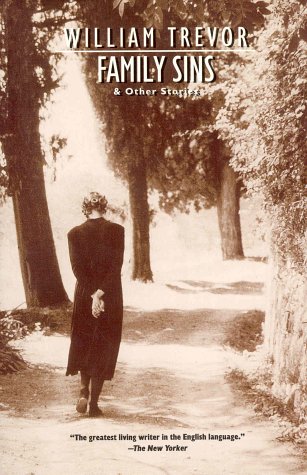Family Sins
by William Trevor. Key Porter Books, 251 pages.
Any writer who has been declared "the greatest writer in the English language" by an army of prestigious critics - the New Yorker, the London Free Press etc. - demands a closer examination then most. Like Shakespeare, William Trevor might forever be a victim of his own praise: lauded by so many, the expectations for his work can be so high that one risks a book-ful of disappointment. This fear is not realized in the case of Family Sins, a collection of stories published in 1999 which more or less exists as a good testament to what the literarti have long been so excited about.
Each of these stories takes place in the backwaters of Ireland where a series of townsfolk live their lives of quiet desperation, haunted by divorce, tragedy, disappointment and a life of general betrayal. They aren't necessarily sad stories, but they feature sad characters, such as the couple in "Events at Drimaghleen", whose personal tragedy is exploited by the media, or the titular character in "Kathleen's Field" who, for the sake of her family, endures a life of unhappy servitude. As narrator (eleven of the twelve stories are third person), Mr. Trevor reveals a genuine compassion for his characters, as if their fates are someone else's doing and not his own. For all their sorrow, each character reveals their own personal strength, whether it is in their wit, bravado or simply the strength to endure an unfortunate life.
Where Mr. Trevor truly proves his mettle, though, is in both the writing and structure. Like all the best authors, his writing never calls attention to itself. There is a poetry to his simplicity and his prose is elegant without ever becoming dull. In structuring these stories, Mr. Trevor often makes time so fluid that his characters easily slide between the present and the past - this is especially clear in the stories of people haunted by unrequited love or ill-fated affairs, like the women in "The Printmaker" or "August Saturday". But even when the structure is more conventional, there is a sense in the prose that these characters are not truly living in the present moment: all of them are somewhere else, recoiling into a world consisting of either memory or fantasy or both.
If I had to pick my favorites from this collection, I'd recommend "In Love with Ariadne" which details a young man's melancholy lust for his landlady's daughter; or "The Printmaker", which has virtually no story and yet manages to propel the reader along. And there is the surprisingly comic "A Trinity" about a couple who get sent on the wrong vacation - I say surprising because though it begins in a comic place, it ends in Mr. Trevor's usual territory of repression and disappointment.

No comments:
Post a Comment